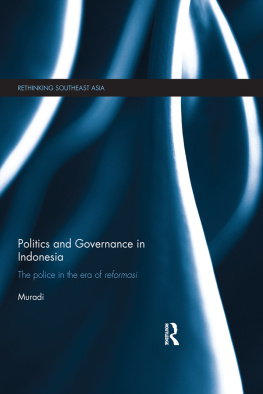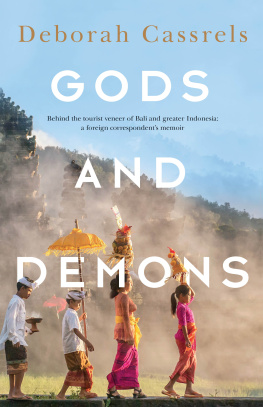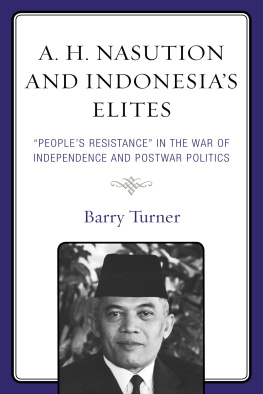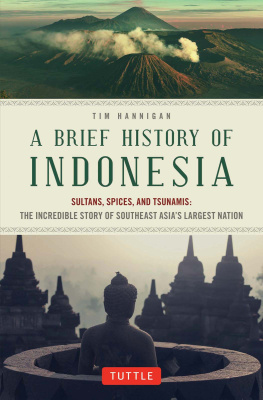Praise for In the Time of Madness:
Lloyd Parry was there for all the great stories. He writes sensitively and well, picking up a fragment of a story here and there and picking away at it so that you begin to get a real insight into a society going down the plughole. Lloyd Parry is a brave and indefatigable reporter who dug deep into a particular excrescence of human evil and came back with a story that is almost too heinous to believe. A bold and beautifully written piece of reporting.
Literary Review (London)
In the Time of Madness [is] the best of its kind to have emerged from the chaos that surrounded the 1998 end of [General] Suhartos rule. Echoes prior greats such as Ryszard Kapuscinski In the Time of Madness is a badly needed addition to what until now was an often ponderously academic bibliography on contemporary Indonesia. A courageously candid account.
Financial Times Magazine (London)
Somber travels across the Indonesian archipelagooften a step ahead of the machete. Readers who take their view of Indonesia from The Year of Living Dangerously arent far from the mark, if Lloyd Parrys account is to be trustedand, as a correspondent for the Times of London, he has sterling credentials. A memorable book that will excite discussion.
Kirkus Reviews
Richard Lloyd Parry is a brilliant storyteller who found himself in a land abundant in tales. This book is a perfect marriage of intriguing land and perceptive narrator. Read it to understand what makes this vast archipelago as sinister as it is fascinating.
Charles Glass, author of Tribes with Flags
Lloyd Parry captures in fine detail the conflicted spirit of modern, boots-on-the-ground reportage: Having confronted the cannibal, do you taste the chunk of human thigh? A powerful and disturbing journey rendered in sensitive, graceful, appealing prose.
Mike Sager, author of Scary Monsters and Super Freaks
Honest, reflective, and self-critical Lloyd Parrys account of two days holed up in the UN missions compound in [East Timor] as the killings proceeded outside provides one of the most incisive portraits of moral failure by the so-called international community which this author has had occasion to read.
The Times (London)
Solidarity with those who suffer most drives [a] work of witness Richard Lloyd Parrys book on Indonesias battles between repression and reform, In the Time of Madness, picks up an awful topicality.
The Independent (London)
It is hardly surprising that there has been so much scope for conflict and strife in a territory that stretches a distance the equivalent of London to Moscow, and which embraces hundreds of different languages, ethnicities, religious beliefs, and cultures . As Lloyd Parry several times alludes to, the history of political behavior and the importance of precedents in the political personality of its leaders and in social action in Indonesia is still important. We can only hope that, just as history is written by the victors, in this case the victors are the ones foreseen by the optimists, and Lloyd Parrys account marks the last time when such wide-spread violence played a part in Indonesian political life.
Kerry Brown, The Asian Review of Books (Hong Kong)
IN THE TIME OF MADNESS
INDONESIA ON THE EDGE OF CHAOS
Richard Lloyd Parry

Copyright 2005 by Richard Lloyd Parry All rights reserved. No part of this book may be reproduced in any form or by any electronic or mechanical means, including information storage and retrieval systems, without permission in writing from the publisher, except by a reviewer, who may quote brief passages in a review. Any members of educational institutions wishing to photocopy part or all of the work for classroom use, or publishers who would like to obtain permission to include the work in an anthology, should send their inquiries to Grove/Atlantic, Inc., 841 Braodway, New York, NY 10003.
First published in Great britian in 2005 by Jonathan Cape,
Random House, London
Printed in the United States of America
FIRST PAPERBACK EDITION
Library of Congress Cataloging-in-Publication Data
Parry, Richard Lloyd.
In the time of madness : Indonesia on the edge of chaos / Richard Lloyd Parry.
p. cm.
eBook ISBN: 978-1-5558-4863-7
1. IndonesiaDescription and travel. 2. Parry, Richard Lloyd
TravelIndonesia. 3. East TimorHistoryAutonomy and independence
movements. I. Title.
DS620.2.P37 2006
959.8039dc22 2005050302
Maps designed by Reginald Piggott
Grove Press
an imprint of Grove/Atlantic, Inc.
841 Braodway
New York, NY 10003
To Fiona
Someone will always do what the gods want us to do.
I remember rats swarming all of a sudden
From unknown holes, just before the war.
Goenawan Mohamad
PROLOGUE
BAD DREAMS IN BALI 1996

Towards the end of my first time in Indonesia I stayed in a house on the edge of the jungle and dreamed the worst nightmares I have known since I was a child. The house was a bungalow of wood and thatch with a road on one side and on the other a wooden couch where I slept under the sky. A thicket of palms and flowering trees descended to a river at the bottom of a steep valley. At night, the sound of cars and motorbikes fell away and the noises of the forest rose up around my bed: the electrical sound of the insects, the flutter of birds wings, the rush of water.
I spent the evenings alone in the tourist cafs and bars down the road. Later, after I had fallen asleep with the jungle in my ears, I dreamed of knives and faces, and gigantic alien creatures which were half-lobster and half-wasp. I dreamed of a mobile telephone that would not stop ringing and of endless conversations with a man named Colonel Mehmet.
The island of Bali, where I was staying, was peaceful. The violence in Jakarta had caused no reverberation here. Or that was the impression which the local people were at pains to give: the smiling woman who gave me the bungalow key, the boy in the sarong who came in the mornings to sweep the floor and change the linen. Every day he brought offerings of petals and rice which he placed on high ledges, to thank the benevolent spirits, and on the ground, to appease the demons. He showed me how to summon him by means of a wooden gong which hung from the eaves of the bungalow. Its hollow body was carved into the shape of a grimacing goblin; the stick was the giant erect penis which the goblin brandished between its claws. But either the offerings were too small or the goblin was not fearsome enough, for the next night the evil dreams came again.
They began with Colonel Mehmet on the mobile phone. You not strong enough are! he bellowed. Or not clever enough. Ja! And all the time you are such a fine fellow, too! In my dreams I tried throwing the phone away, burning it, even drowning it in the bath, but always it floated ringing to the surface as the colonel and his men drew nearer.
The trouble in Jakarta had upset me, perhaps more than I realised.
It had begun a month earlier with an unprecedented event: a mass demonstration by members of the opposition democratic party. All day and night, hundreds of people had camped out in the party headquarters, singing songs, telling stories and delivering speeches in support of democracy. All had been careful not to mention the president by name, but everyone knew that the demonstration was a direct challenge to him, the strongest and most intense criticism he had faced in thirty years. It was breathtakingly bold; it seemed unthinkable that it could be allowed to go on. But days passed and the demonstrators were left undisturbed.
Next page










